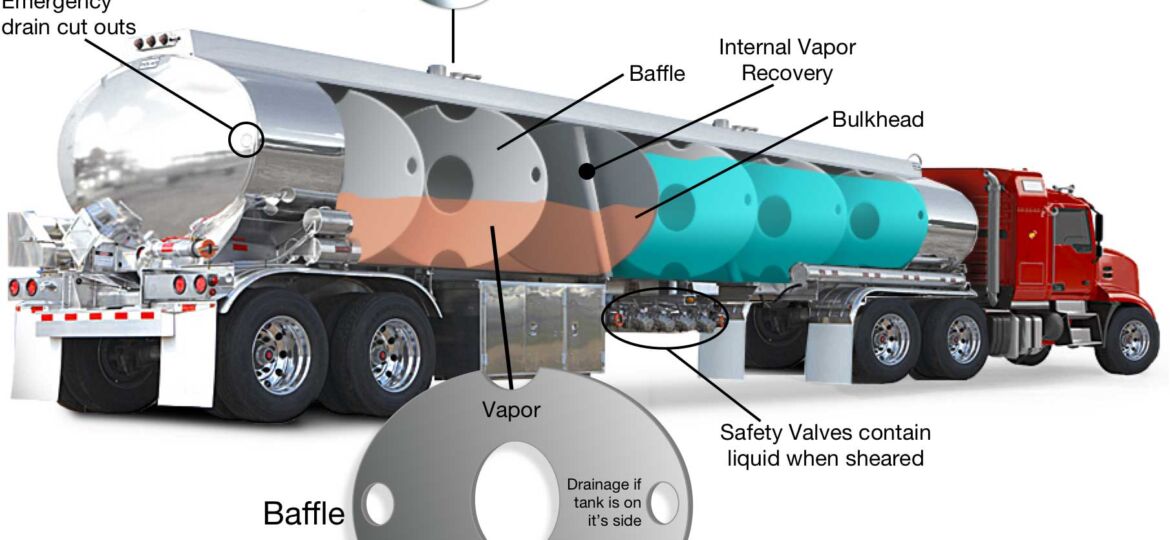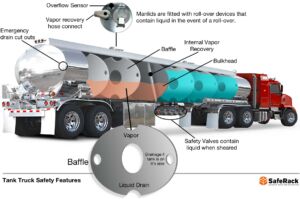
Road Tanker Safety: Design, Equipment, and the Human Factor
11/04/2020 by SafeRack
Roughly one-quarter of all freight hauled in the United States is transported in tanker trucks, and of that, nearly half is petroleum products like gasoline, diesel, and aviation fuel.
With so much hazardous cargo on the nation’s roads — and accidents involving cars and road tankers not exactly uncommon — why are there surprisingly few spillages and fatalities?
The credit goes to three things: tanker design, safety equipment, and driver training.
Tanker Design
With roughly 1.22 billion tons of gasoline, Avgas, diesel fuel, Jet A, and other chemicals being hauled each year in tanker trucks that can each hold 10,000 gallons of product, tanker design is vital when preventing accidents.
When hauled, fuel expands and contracts depending on its ambient temperature. It can also move inside the tank and lead to an ever-changing center of gravity for the vehicle.
This potential danger is mitigated by tankers being designed with low centers of gravity, as well as internal bulkheads (or baffles) which separate products and add strength to the tanks (see below).
- Trained Professionals – A semi-trailer will often be transporting 10,000 gallons of fuel and driving the tanker is a highly skilled professional.
- Electronic Stability Control systems can be fitted to trucks. ESC anticipates rollovers and loss of directional control. It’s an intelligent controller, a box of electronics that can apply brakes on the vehicle in a way that will improve its control. So, for example, if the system perceives that a truck is likely to roll over as it’s going too fast into a corner, ESC can intervene to brake the truck and slow it down.
- Safety Valves – Valves on the bottom of the truck are designed to shear off and safely secure the liquid in the tanker during an accident or if a vehicle drives an undertaker tanker.
- Manlids on the top of the tanker are fitted with roll-over devices that in the event of a rollover will seal the aperture. The danger on the top of the tanker is that the expansion and contraction of the fuel mean that each compartment must be able to breathe (or the pressure in the tank could fracture it catastrophically). Allowing the tank to breathe means that in the event the tanker rolls over, there would be an obvious leak path for liquid to escape which could cause a fire or an environmental catastrophe.
- Internal bulkheads, baffles, and tanks engineered for a low center of gravity – Fuel is expanding and contracting with temperature and moving around the tanker as it drives around corners and is accelerating or braking, which constantly changes the vehicle’s center of gravity. To reduce the impact of this, tankers are designed with very low centers of gravity and have internal bulkheads fitted for strength and to separate each liquid compartment. They also have baffles to reduce product surge when braking or cornering (see below).
- Fires will still occur. The issue is to ensure that in the event of a fire, you design equipment to allow for a uniform burn rather than a catastrophic explosion. A fire will raise the pressure in the tank, but each manlid is fitted with a fire engulfment vent that will release this pressure in a fraction of a second and then re-seal. This will allow the fire to burn but will prevent an explosion.
to continue reading this article, please click on the link below…
https://www.saferack.com/road-tanker-safety-design-equipment-human-factor/
Oilfield Accident Lawyer Oilfield Accident Attorney
CALL GIUNTA LAW NOW FOR A FREE CONSULTATION
800-515-7200

After an oilfield accident, it is important to work with an experienced legal team that can collect and preserve all necessary evidence for your case including physical evidence, accident reports, corporate documentation, witness statements, and expert opinions. Our team will begin an immediate investigation to identify the cause of the accident and pursue claims against all liable parties.
An oilfield injury or death may be caused by:
- Company failure to take reasonable precautions
- Improper employee training
- Oilfield Safety Violations
- Improper maintenance of oilfield equipment
- Defective products & oilfield machinery
- Drug & alcohol abuse
- Negligent operation of oilfield equipment
Individuals injured by oilfield accidents often suffer catastrophic injuries, including wrongful death. Our oilfield lawyer team has the legal and medical experience to effectively handle a range of cases involving serious & complex injuries caused by explosions and burns, falls, defective products and equipment, toxic fumes and fires.
Giunta law is committed to pursuing an aggressive case against all liable parties and will seek to collect the full compensation you are entitled to for lost wages, pain and suffering, long-term care needs, disability and impairment, and any additional personal or financial losses you have sustained due to an oilfield accident or injury.
Oilfield Accidents and Injuries are on the Rise
Oil and gas industry injuries are the most dangerous and fatal in the country. From 2003 to 2010, the U.S. oil and gas industry (both onshore and offshore combined) had a collective fatality rate that was 7 times higher than the rate for all U.S. workers combined. Louisiana had 5 catastrophic refinery and oil rig explosions between January and October 2017, more than any other state in the country.
What to do After an Oilfield Accident
-
Stop working immediately
-
Report your oilfield injury as soon as possible.
-
Ask for immediate medical treatment.
-
Do not give a formal statement, sign ANY paperwork, or accept any money from the company (besides your normal paycheck) prior to speaking with an experience oilfield accident lawyer.
-
Contact an experienced oilfield accident attorney as soon as possible.


